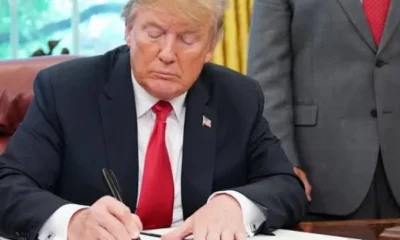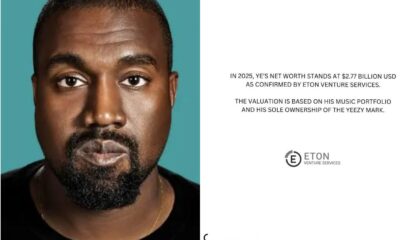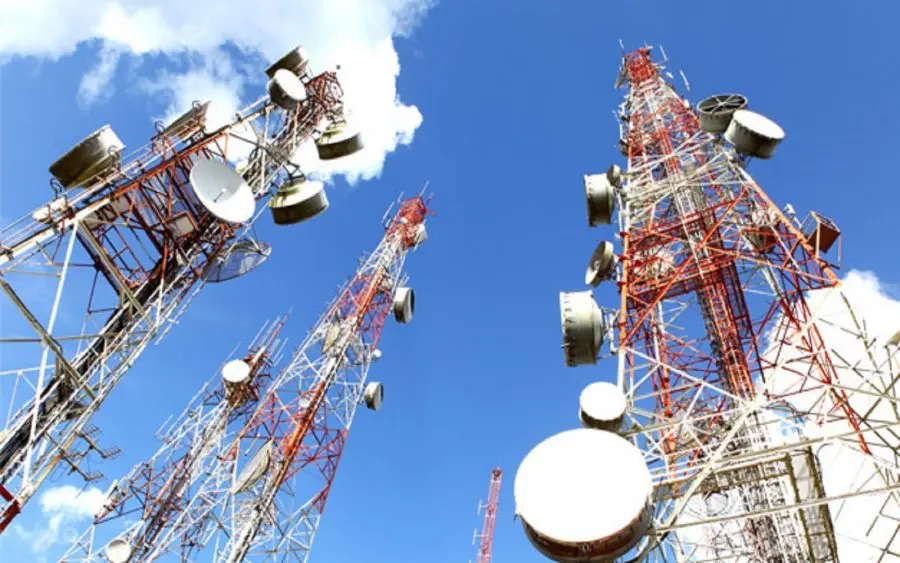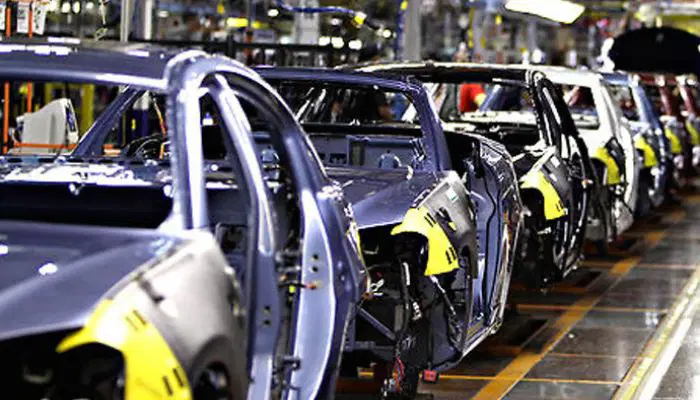Tech
Naira Collapse: Tinubu’s Aide Tells Central Bank, EFCC to Ban Crypto Exchange Platforms In Nigeria
Published
1 year agoon
By
Ekwutos BlogOnanuga, gave the advice in a statement he shared on his X (formerly Twitter) handle on Wednesday. He also suggested that Crypto channels should be banned in the country, otherwise, “this bleeding of our currency will continue unabated”.
The Special Adviser on Information & Strategy to President Bola Tinubu, Mr Bayo Onanuga has called on the Economic and Financial Crimes Commission (EFCC) and the Central Bank of Nigeria (CBN) to move against platforms trying to manipulate the naira through crypto exchange platforms.
Onanuga, gave the advice in a statement he shared on his X (formerly Twitter) handle on Wednesday. He also suggested that Crypto channels should be banned in the country, otherwise, “this bleeding of our currency will continue unabated”.
Titled: “The Naira-Dollar manipulators,” the presidential aide explained how he chanced upon an X post Tuesday night made by one Brother Bernard, who according to him, rallied against what he called the order of the EFCC, NSA (National Security Adviser) on Finance to set a cap on traders selling USD tokens for naira equivalent.
According to the presidential aide, the said Bernard disclosed that token sellers had migrated to Telegram and were selling naira at N1850 and above.
Onanuga said, “He did not stop there, he lashed out at the Nigerian authorities over the efforts to arrest the slide of the Naira. He wrote: ‘If this is how they plan to save the naira, I’m sorry but it’s going to fail woefully. Binance was only a medium. If you block Binance, people will find new ways. This whole policy is absolutely ridiculous. Naira is going to zero’.
“Naira going to Zero? Is the owner of this account a Nigerian patriot? I checked Bernard’s profile. He says he is “BUIDLing something for migrants” and he is the “Chief Commander of Japa”. Bernard also posted a web link www. http://exposingagbado.com.
“My curiosity has paid off. Bernard is one of those implacable supporters of President Bola Ahmed Tinubu’s opponents in the last election, still having an axe to grind; otherwise, why will any patriotic Nigerian wish that “Naira is going to Zero”.
“On Tuesday, Bernard shared Naira-Dollar rates on some unidentified platforms, possibly Telegram, where Naira is being traded at N1900-N1950 to a US dollar.
“He also enjoined forex traders or token holders to move their funds to ‘kucoin or bybit or your own cold wallet.’”
Onanuga regretted that Bernard reported on Wednesday that Binance had removed Tuesday’s cap and had now put another cap on the naira-dollar exchange. It is now N1892, he said, with a trading range of N1392 and N1892.
The presidential aide said, “He was not happy about the new cap and attacked Binance: ‘Binance continues their games with Nigerians. Caps at 1892 when clearly the exchange rate is almost 2000/$ on other platforms. Trade elsewhere (NFA)’.
“He retweeted a post by ‘Olumide capital’, who said Binance ‘distances itself from the forex debacle in Nigeria. Olumide reported that Binance said its platform is “market-driven and not intended to be a proxy for currency pricing in Nigeria.’”
Calling on the authorities to go after currency manipulators, the presidential aide explained that Binance, “which is blatantly setting exchange rate for Nigeria, hijacking CBN role, is a cryptocurrency trading platform, which has suffered access limitations from multiple jurisdictions, in the US, Singapore, Canada and the UK”.
Citing Data Wallet, Onanuga said that Binance is prohibited in the United Kingdom by the Financial Conduct Authority from conducting any regulated activities.
He continued, “In Japan, the Financial Services Agency (FSA) banned Binance for operating without the necessary regulatory approval.
“Ontario, Canada, has also suspended Binance services following its inability to meet the province’s securities regulation criteria. The Monetary Authority of Singapore also banned Singaporean investors from accessing Binance’s services.”
He added Binance, “which is currently facing regulatory showdown in many countries, and causing disruptions in the currency market, should not be allowed to dictate the value of the Naira, not on its crypto exchange platform.
“Other crypto platforms such as Kucoin, Bybit should be banned from operating in our cyberspace.”
“FX platform Aboki should be re-banned,” he suggested. He advised that the “EFCC and the CBN should move against these platforms trying to manipulate our national currency to Ground Zero”.
“Crypto should be banned in our country or else this bleeding of our currency will continue unabated,” he added.
You may like


I did not authorise closure of Lagos Independence Bridge – Umahi


Natasha homecoming: Police calls for cancellation of Okene rally


State of emergency: We will emerge stronger – Fubara to Rivers people


Pastor Adeboye: Christian group claims responsibility for arrest of popular TikToker, Seaking


Massive Backlash as Trump Signs Controversial Ban


Kanye West reclaims Billionaire status, reveals his eye-watering net worth
Tech
They only know how to drain data’ – Telecom consumers lament tariff hike, poor network
Published
2 days agoon
April 14, 2025By
Ekwutos Blog
Some telecommunication services consumers in the Federal Capital Territory, FCT have urged Mobile Network Operators to improve their services to match the recent hike in their tariffs.
They made the call in separate interviews with NAN on Monday in Abuja.
The subscribers said despite the increase in subscription rates mobile networks could remain epileptic for hours.
In a publication dated February 6, 2024, the Executive Vice-chairman of the Nigerian Communications Commission, Dr Aminu Maida, said that the commission would hold service providers accountable for poor service delivery.
Mr Ogah Paul, one of the subscribers said he had enough data on his network but could not access the internet because of the epileptic network.
He urged service providers to fix the problems surrounding the poor services.
“The only thing they know is to drain data without any good service delivery. I feel like crying because of a problematic network. I have been receiving server errors since morning.
“To even download and watch a video sent to me since, takes me almost one whole day. “I wonder if members of staff of the service providers are enjoying the service they render to us.
“We cannot make calls, access the internet or even receive calls,’’ he said.
According to him, unfortunately, the network providers put up some of the best adverts about their products and services which they cannot meet.
Mr Victor James, another subscriber said he had enough data but was not able to use it to his satisfaction.
“Why does their data plan not reflect immediately when you buy data? Sometimes it takes as much as 24 hours to reflect.
“I am tired of this. The network is really bad. I have enough data but I cannot use it the way I want.
“I hope the issues get resolved as soon as possible so that I can access my data without further delay,” he said.
However, Ms Josephine Tanko, told NAN that she had no problems with her network providers.
“It is fast and reliable. I think it is the network that gives the best internet speed and quality.
“It will always be my best that is why I will always choose it over any other network,” she said.
She called on networks that did not meet their subscriber’s expectations to ensure that they improved their services.

By Adegboyega Adeleye
The importance of cars in transportation cannot be overemphasised with some countries known for their production.
Transportation is required for work, school, and industry, with car production fast becoming a major producer of revenue and a player in the global was financial market.
Car production is one of the largest economic sectors internationally; however, some countries produce more cars than others. The list of countries by motor vehicle production is based on statistics by the International Organization of Motor Vehicle Manufacturers.
The world’s car manufacturers put another 93.5 million vehicles on the roads in 2023, the last full-year numbers currently available.
This article will explore the top 5 countries with the highest car production.
1. China
China, the world’s biggest manufacturer overall, leads the world in car production. The country’s 2023 production totaled more than 30 million vehicles, adding up to more than 30% of all cars and trucks produced globally.
The largest domestic car manufacturers in China, known as the traditional “Big Four,” are SAIC Motor, Dongfeng, FAW, and Chang’an.
2. United States
The United States–a major automotive producer, known for its large vehicle market–is the second biggest auto manufacturing country with a volume of 10,611,555. This represents about 5.5 percent growth compared to the 10,060,339 produced in 2022.
The United States produces less than half of what China does, having manufactured about 1.8 million cars and 8.3 million commercial vehicles in 2022. The United States’ largest car manufacturers, referred to as the “Big Three,” are General Motors, Ford Motor Company, and Fiat Chrysler.
3. Japan
Japan ranked as the third biggest automobile-producing country in the world with a total volume of 8,997,440 vehicles manufactured in 2023. The country is a significant player in the global automotive industry, known for its engineering and quality.
After a sudden drop in production from 2020-2022 due to the COVID-19 pandemic, Japan produced just under 9 million vehicles in 2023 (8,997,440)–a drop from its pre-COVID total of nearly 9.7 million in 2019.
However, the volume grew by 14.8 percent compared to the 7,835,519 produced in 2022.
Japan’s automotive industry is one of the largest industries in the world. The country’s automotive manufacturers include Toyota, Honda, Daihatsu, Nissan, Suzuki, Mazda, Mitsubishi, Subaru, Isuzu, etc.
4. India
India is the fourth-largest automobile-producing country in the world with a total number of 5,851,507 manufactured in 2023. The volume of vehicles grew by 7.2 percent compared to 5,456,857 vehicles produced in 2022.
Although, India is not renowned in America or Europe as a vehicle manufacturer, the Asian nation produced 5.8 million cars in 2023– an annual increase of 7%. India’s export markets for vehicles include Saudi Arabia, South Africa, and Mexico.
The nation is rapidly growing as an automotive market and producer.
5. South Korea
South Korea is the fifth-largest auto-producing country in the world. The country manufactured a total of 4,244,000 vehicles in 2023, representing a growth of 13 percent from a total of 3,757,049 vehicles produced in 2022.
The major South Korean automobile manufacturers include GM Korea, Hyundai Motor Group and its affiliate, Kia Corporation along with Renault Korea Motors.
Tech
A lot of people don’t know this but do you know that all your internet connections and services are powered by Glo, not all but majority is powered by an under see cable called GLO1 THAT’S owned by Glo1.
Published
3 days agoon
April 13, 2025By
Ekwutos Blog
Now because they make more money from this than selling as retailers that’s why they don’t care about their ISP SERVICE in retail quantities.
It’s like a bakery, they are most focused on selling to bulk buyers than single house hold user’s.
So you MTN, GLO AND ALL THAT are mostly connected to GLO1 even banks and may other platforms.
Ok let me break everything down.
1. Glo’s GLO-1 Cable:
GLO-1 is a private submarine cable owned by Globacom. It stretches from Nigeria to the UK and connects several West African countries. It was Nigeria’s first privately owned international submarine cable, launched around 2010.
Key Facts about GLO-1:
• Length: Over 10,000 km.
• Capacity: Designed for up to 2.5 Tbps.
• Landfall points: UK, Portugal, Senegal, Côte d’Ivoire, Ghana, and Nigeria.
• Purpose: Meant to reduce dependence on SAT-3 and provide high-speed internet capacity.
⸻
2. Why Glo May Not Focus Heavily on Retail ISP Services:
Glo essentially plays two roles:
• Infrastructure owner (wholesaler)
• Internet provider (retailer)
The wholesaling of the GLO-1 cable (and other bandwidth infrastructure) can be significantly more profitable and less stressful than managing millions of data subscribers in Nigeria with high expectations and poor last-mile infrastructure.
So yes:
Glo likely focuses more on selling bulk bandwidth to big clients than pleasing end users.
⸻
3. Who Are Glo’s GLO-1 Subscribers (Wholesale Clients)?
These can include:
• Telecom companies: ISPs, other mobile network operators.
• Banks and financial institutions.
• Tech companies and data centers.
• Government institutions.
• Educational institutions (for broadband research/academic access).
• CDNs and enterprise clients (e.g., Netflix, Google, Meta might use transit partners who tap into GLO-1).
4. How Many Submarine Cables Does Glo Own?
• Only One: GLO-1 is the only submarine cable Globacom directly owns.
• However, Glo might lease or partner to access others like:
• SAT-3 (older system, via NITEL/NTEL)
• ACE, WACS (via partnerships or regional consortiums)
So , Glo’s focus on being a wholesale bandwidth provider through GLO-1 might be one reason why their retail ISP service suffers in terms of customer satisfaction. They’re likely making more consistent revenue selling to institutions, ISPs, and data centers than from individual subscribers who demand high-quality, stable data service — which requires serious investment in towers, backhaul, and customer service
Copyright of Isaac Rocks Adeiza (Original Owner must be tagged to any Redistributions of content)
Content can’t not be redistributed for profit purposes.

LAGOS – CALABAR COASTAL HIGHWAY: GOV ENO LAUDS FG, SAYS IT IS A CATALYST FOR ECONOMIC BOOM

Rivers Assembly: Court dismisses Labour Party’s suit against Amaewhule, 26 others

US judge blocks deportation of immigrants from four countries by Trump administration
Trending

 Trending6 months ago
Trending6 months agoNYA demands release of ‘abducted’ Imo chairman, preaches good governance
- Business6 months ago
US court acquits Air Peace boss, slams Mayfield $4000 fine

 Politics6 months ago
Politics6 months agoMexico’s new president causes concern just weeks before the US elections
- Entertainment6 months ago
Bobrisky transferred from Immigration to FCID, spends night behind bars
- Entertainment6 months ago
Bobrisky falls ill in police custody, rushed to hospital

 Politics6 months ago
Politics6 months agoRussia bans imports of agro-products from Kazakhstan after refusal to join BRICS

 Politics6 months ago
Politics6 months agoPutin invites 20 world leaders
- Politics1 year ago
Nigerian Senate passes Bill seeking the establishment of the South East Development Commission.

